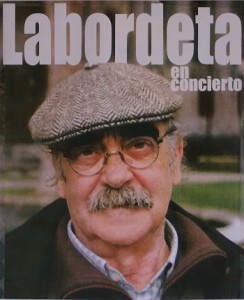
Politics and sport don’t mix, so the saying goes. Except in the case of Madrid’s working class heroes Rayo Vallecano. The third-tier soccer club’s famously leftist fans observed a minute’s silence before the start of their game on September 26 against Aragonese side Huesca in memory of José Antonio Labordeta, the singer, poet, and politician who died on September 18 after a long illness.
Labordeta came to prominence in the final years of the Franco regime by combining traditional Aragonese tunes with modern Spanish folk music, and captured the spirit of a generation tired of waiting for the dictator to die. Over the years he stuck to his principles, vociferously opposing Spain’s initial involvement in the US-led invasion of Iraq in 2003.
Among those who paid homage to Labordeta was King Juan Carlos, who described him as “a great Spaniard and a great patriot.”
Born in the Aragonese capital of Zaragoza in 1935, Labordeta graduated from the city’s university and became a teacher while pursuing his musical, literary, and political interests.
In 1976, he founded the Aragon Socialist Party, later standing for the Senate on behalf of United Left, and finally joining the Chunta Aragonesista, representing the nationalist grouping in Congress between 2000 and 2008.
Meanwhile, he became a popular television presenter, hosting a series in which he explored —armed with a backpack, musical instrument, pen, and notepad— many of Spain’s little-known rural backwaters.
His funeral, held at the seat of the Aragonese regional government, was a musical affair, with many of the 35,000 people who turned up to say a final farewell bringing their guitars. The event closed with an impromptu mass recital of his best-known song, Canto a la Libertad. Such is his standing in the region that the song has become the unofficial anthem of Aragon.
The mayor of Zaragoza, former Socialist Party minister Juan Alberto Belloch, has agreed to rename the city’s Primo de Rivera park, which was built in honour of the military dictator who ruled Spain between 1923 and 1930, after Labordeta. A fitting tribute if ever there was one.
And here he is singing it.
http://www.youtube.com/watch?v=i15eFc_BCu4